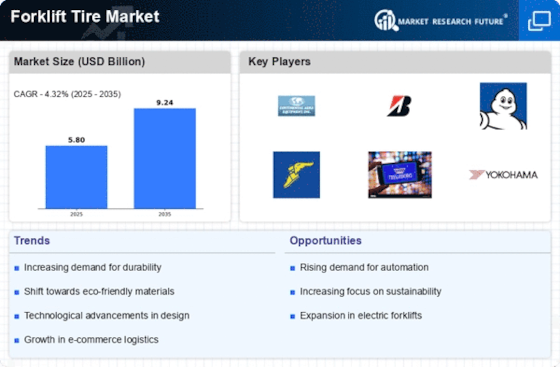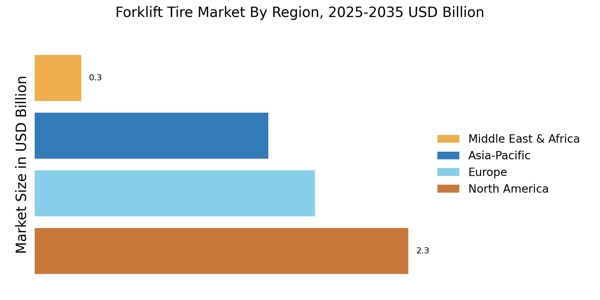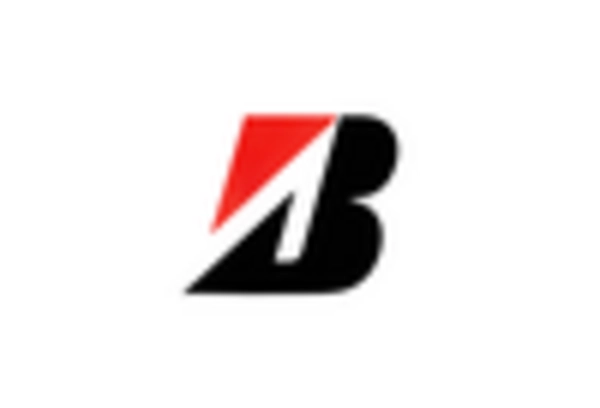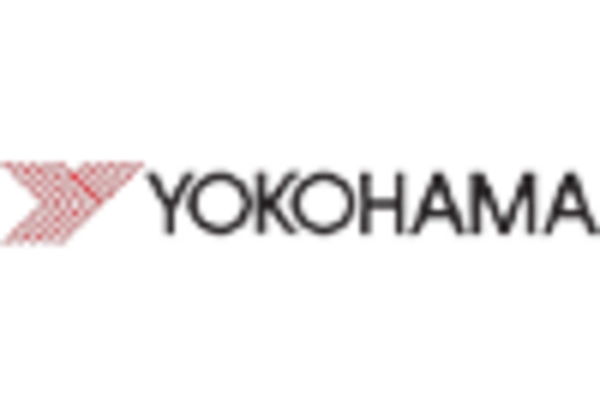Growth of E-commerce and Warehousing
The expansion of e-commerce and warehousing facilities is a significant driver for the Forklift Tire Market. As online shopping continues to gain traction, the need for efficient logistics and storage solutions becomes increasingly critical. Warehouses are investing in advanced material handling equipment, including forklifts, to streamline operations and meet consumer demands. Data indicates that the warehousing sector is expected to grow by over 10% in the coming years, which will likely lead to a corresponding increase in the demand for forklift tires. This trend presents an opportunity for manufacturers to innovate and provide specialized tires that cater to the unique requirements of e-commerce operations, thereby enhancing the overall efficiency of the Forklift Tire Market.
Focus on Safety and Compliance Standards
Safety regulations and compliance standards are increasingly influencing the Forklift Tire Market. As organizations prioritize workplace safety, the demand for tires that meet stringent safety criteria is on the rise. Forklift tires must adhere to specific regulations to ensure they provide adequate support and stability during operations. The implementation of safety standards not only protects workers but also minimizes operational risks. Consequently, manufacturers are compelled to innovate and develop tires that comply with these regulations, which may lead to enhanced performance and longevity. This focus on safety is expected to drive growth in the Forklift Tire Market, as companies seek to invest in tires that align with their safety protocols.
Sustainability and Eco-friendly Practices
Sustainability initiatives are becoming increasingly relevant in the Forklift Tire Market. As companies strive to reduce their environmental footprint, there is a growing demand for eco-friendly tire options. Manufacturers are exploring sustainable materials and production methods to create tires that are not only efficient but also environmentally responsible. The shift towards sustainability is reflected in consumer preferences, with many businesses prioritizing suppliers that demonstrate a commitment to eco-friendly practices. This trend is likely to drive innovation within the Forklift Tire Market, as companies seek to develop products that align with sustainability goals while maintaining performance standards. The integration of sustainable practices may also enhance brand reputation and customer loyalty.
Technological Innovations in Tire Manufacturing
Technological advancements in tire manufacturing are reshaping the Forklift Tire Market. Innovations such as the use of advanced materials and manufacturing processes are leading to the production of tires that offer improved performance, durability, and cost-effectiveness. For instance, the introduction of smart tires equipped with sensors can provide real-time data on tire pressure and wear, allowing for proactive maintenance and reducing downtime. This technological evolution not only enhances the operational efficiency of forklifts but also contributes to the overall safety of material handling operations. As manufacturers continue to invest in research and development, the Forklift Tire Market is poised for growth, driven by the demand for high-performance tires that leverage these technological advancements.
Increased Demand for Material Handling Equipment
The rising demand for material handling equipment is a primary driver for the Forklift Tire Market. As industries expand and logistics operations grow, the need for efficient and reliable forklifts becomes paramount. According to recent data, the material handling equipment market is projected to grow at a compound annual growth rate of approximately 5.5% over the next few years. This growth directly correlates with the demand for high-quality forklift tires, as they are essential for optimal performance and safety. The Forklift Tire Market is likely to benefit from this trend, as manufacturers strive to produce tires that enhance durability and traction, thereby meeting the evolving needs of various sectors, including warehousing, construction, and retail.

















